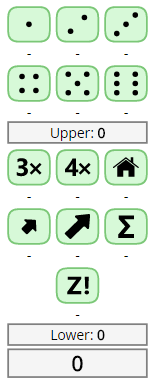How to play: Yat-Z! - Blog
How to play: Yat-Z!
Yat-Z is the classic dice rolling and scoring game that involves forming "poker" hands and other high scoring combinations with dice. Luck plays a big role in the classic variation, but the luck factor is reduced in duplicate mode.
Contents
Objective

Roll five dice up to three times every turn, holding any number of dice and rolling the remaining dice each time. Try to form combinations of dice that fit a scoring category.
Each scoring category may only be used once. You must choose a scoring category each turn. If your dice does not fit the scoring category description, it will score zero.
The game ends when all scoring categories have been used, and the player with the most points wins.
Scoring categories
Upper section
The six scoring categories in the upper section are Ones, Twos, Threes, Fours, Fives and Sixes. The points scored in these categories are equal to the sum of the dice matching the category name.
For example, if your dice show three 4's, choosing the Fours category will net 4 × 3 = 12 points.
If the total score for all the upper categories is 63 or more, a 35 point bonus is awarded.
Lower section
The seven scoring categories in the lower section are Three of a Kind, Four of a Kind, Full House, Small Straight, Large Straight, Chance and Yat-Z.
Three of a Kind scores the sum of all the dice if there are three of the same dice values showing.
Likewise, Four of a Kind scores the sum of all the dice if there are four of the same dice values showing.
Full House scores 25 points if there is a Three of a Kind, and the remaining two dice have the same value as each other.
Small straight scores 30 points if there are four dice in sequential value from 1 to 4, 2 to 5, or 3 to 6.
Large straight scores 40 points if all five dice are in sequential value from 1 to 5 or from 2 to 6.
Chance scores the sum of all dice and does not need to fit any pattern.
Yat-Z, or Five of a Kind, scores 50 points if all dice have the same value.
If Yat-Z has been scored, every subsequent Yat-Z rolled adds a 100 point bonus to the lower section. The Yat-Z can then be used to score the maximum in the corresponding upper category. If the upper category has been used (e.g. if five ones have been rolled and the Ones category has been used), then an unused lower category may be chosen. The lower category will score points even if the dice do not match the description.
Duplicate mode
In duplicate mode, the dice outcomes are predetermined. You will see the same dice outcomes that other players see for the same game; however, they may make different dice holding and category choices than you.
This reduces the luck factor because the player that makes the best decisions will generally have a better score.
Duplicate games are played in private and not simultaneously with the other opponents (except for tournament play). After a game has been played by five different players, the scores are compared.
Komentari (0 )